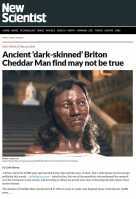What did everyone put for the 'certain' there is no God question?
I "feel" pretty sure there is no God because it is extremely unlikely due to zero lack of evidence. However - I couldn't say anything was "certain" about it so I had to answer 0 certainty.
I am either being a pedant or read the question wrong.
Last moth we were all certain ancient Eurpopeans were 'black or dark' skinned... this week the same people are saying they're not certain in New Scientists. Is anything really certain?

Enjoy being online again!
Welcome to the community of good people who base their values on evidence and appreciate civil discourse - the social network you will enjoy.Create your free account
9 comments
Feel free to reply to any comment by clicking the "Reply" button.If there was a god, there would be a difference in cancer remission rates by different religions or faiths.
Is anything ever completely 100% certain? Nope. However, I would argue that their does come a point when the evidence is so overwhelming it becomes peverse to deny it. This is what most people would call a fact. I myself did not tick the '100% sure' box, but I would say for all intents and purposes that I was as sure as sure can be that there is no such thing as a god
The strong point about science is that it is open to changing its mind when new evidence comes up or when a better interpretation of the evidence is presented. Religion is not like that - no matter what the evidence, religious people are not open to changing their minds. I am as certain there is no god, as I am that the theory of evolution by natural selection is correct, but despite that, if evidence is brought forward, I am open to changing my mind about either.
I put "not 100% certain" because I have no way of searching the entire universe or multiverses to confirm my disbelief. But common sense leads me to believe that there is no god...because of the lack of evidence. The gods in holy books don't even count as possibilities.
I think that question has as many answers as the people responding to it....some feel quite certain about things that can not be proved or disproved. Others tend to be a little more fluid. Most people I've talked with admitted that over the years their opinions have changed - sometimes just a little, sometimes a lot. Personally, I can imagine a scenario where some entity (life force?) could push the button, so to speak, which starts the chain of events we refer to as evolution. No either/or - the two theories can both simultaneously exist. One thing I'm quite sure of - IF there was some sort of creator who started all this - he/she/it "left the building" a really long time ago. 
Science is always changing theories. Nothing is stagnant.
There is no God at least in the sense it has been traditionally defined. I am open to the idea that there may be beings and advanced civilizations that defy our current thinking about the limits of technology. But a singular all-powerful being that brought the universe into existence and is aware of the day to day trappings of each and every one of us and judges all of us for our deeds, no. That there may be many universes, that there is a cycle of universes being created and destroyed over unfathomable time scales, very possible.
Enjoy being online again!
Welcome to the community of good people who base their values on evidence and appreciate civil discourse - the social network you will enjoy.Create your free account
Share this post
Categories
Agnostic does not evaluate or guarantee the accuracy of any content. Read full disclaimer.







